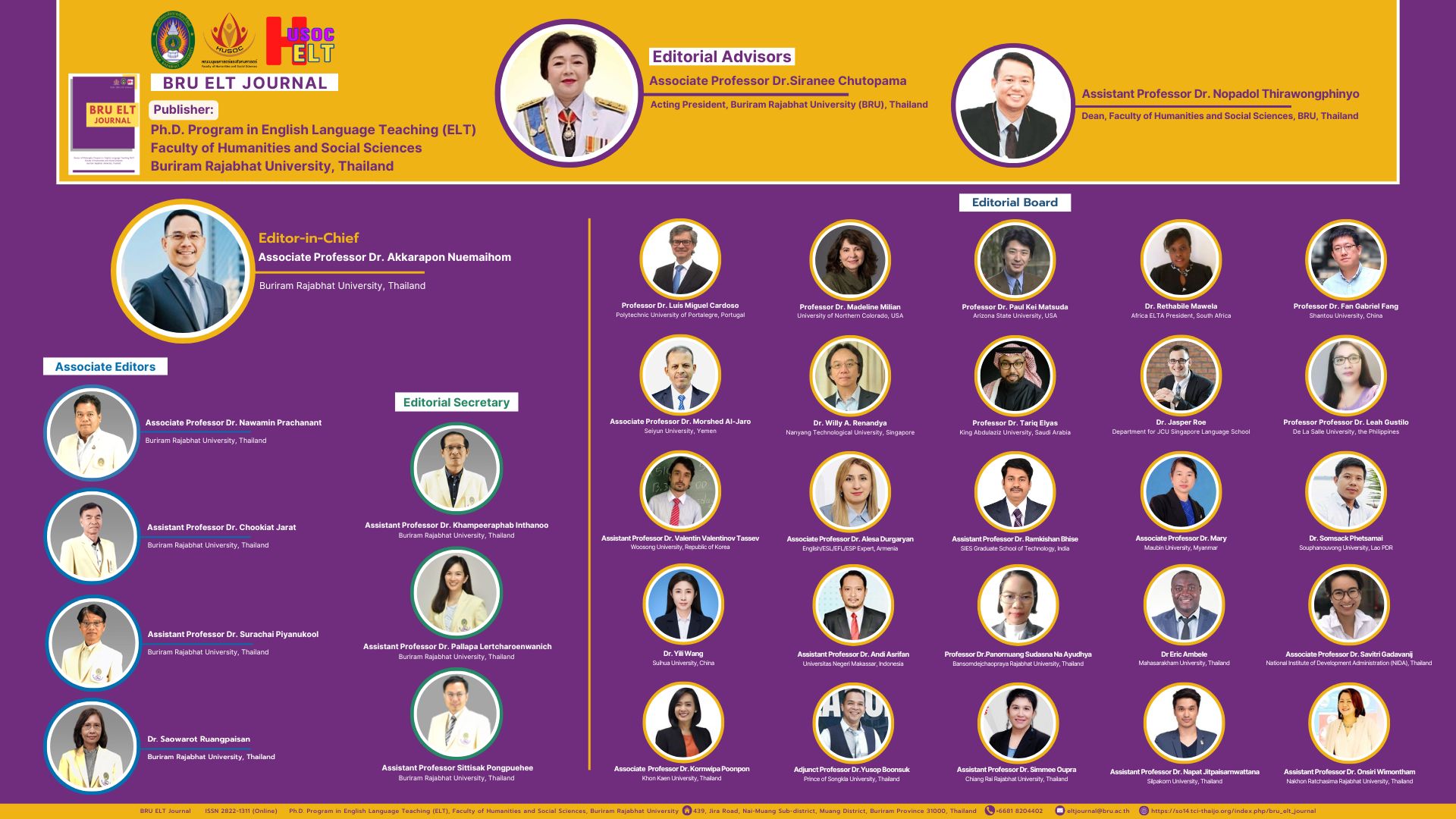Addressing College Students’ Writing Difficulties through Cooperative Learning and Inquiry-Based Learning Approaches
DOI:
https://doi.org/10.14456/bej.2024.6Keywords:
writing quality, cooperative learning, inquiry-based learningAbstract
High proficiency in college students’ writing is beneficial for their academic success. The dynamic nature of higher education demands effective communication through writing, making it imperative to understand the prevalent issues hindering students' success in this area. This study assessed the effectiveness of Cooperative Learning and Inquiry-based Learning in improving writing difficulties among college students. Conducted over eight weeks at a private university in Cagayan de Oro City, Philippines, this quasi-experimental research involved 64 participants. The study utilized a comprehensive rubric assessing content, organization, grammar, vocabulary, and mechanics to evaluate the students' essays. Results demonstrated notable improvements in both Cooperative Learning and Inquiry-based Learning, with students progressing from 'Emerging' to 'Proficient' levels in writing. These enhancements were significant in all assessed areas, highlighting the effectiveness of the interventions. While both methods were found effective in improving writing proficiency, the Inquiry-based Learning approach stood out as more effective, particularly in improving grammar. This finding emphasizes its role in elevating the overall writing quality of college students. The study's outcomes not only affirm the effectiveness of their pedagogical strategies in enhancing writing abilities. Future research is recommended to further investigate the nuances of these learning approaches, as identified in this study.
References
Adhami, N., & Taghizadeh, M. (2022). Integrating inquiry-based learning and computer supported collaborative learning into flipped classroom: Effects on academic writing performance and perceptions of students of railway engineering. Computer Assisted Language Learning, 1-37. https://doi.org/10.1080/09588221.2022.2046107
Bautista, A., & Gonzalez, A. (2013). Writing proficiency among college students. http://jurnal.uinsu.ac.id/index.php/ijlres/article/download/4104/3008
Bernardo, A. B. I. (2007). Language in Philippine education: Rethinking old fallacies, exploring new alternatives amidst globalization. ResearchGate.1-26. https://www.researchgate.net/publication/259189340_Language_in_Philippine_education_Rethinking_old_fallacies_exploring_new_alternatives_amidst_globalization
Dembo, M. H., & Eaton, M. J. (2000). Self-regulation of academic learning in middle-level schools. The Elementary School Journal,100(5), 343-366. https://doi.org/10.1086/727503
Dewey, J. (1933). How we think: A restatement of the relation of reflective thinking to the educative process. MA D.C. Heath & Co Publishers. - References - Scientific Research Publishing. (n.d.). https://www.scirp.org/reference/ReferencesPapersReferenceID=1434306
Di Carlo, M. (2019). Interpreting effect sizes in education research. Albert Shanker Institute. https://www.shankerinstitute.org/blog/interpreting-effect-sizes-education-research
DiNardo, J. (2008). Natural experiments and quasi-natural experiments. Palgrave Macmillan UK eBooks. https://doi.org/10.1057/978-1-349-95121-5_2006-1
Gillies, R. M. (2007). Cooperative learning: Integrating theory and practice. Sage.
Johnson, D. W., & Johnson, R. T. (2009). An educational psychology success story: Social interdependence theory and cooperative learning. Educational Researcher. https://doi.org/10.3102/0013189X09339057
Keeley, S. (2014). Peer editing in college composition: A teacher’s analysis of successful practices. Writing & Pedagogy, 6(2), 379-397. https://doi.org/10.1558/wap.v6i2.379
Kyei-Blankson, L., Ntuli, E., & Donnelly, H. (2016). Establishing the importance of interaction and presence to student learning in online environments. World Journal of Educational Research, 3(1), 48. https://doi.org/10.22158/wjer.v3n1p48
Kuhlthau, C. C. (2013). Rethinking the 2000 ACRL Standards: Some things to consider. Communications in Information Literacy, 7(2), 92-97. https://doi.org/10.15760/comminfolit.2013.7.2.139
Lin, Z. (2013). Comparison of technology-based cooperative learning with technology-based individual learning in enhancing fundamental nursing proficiency. Nurse Education Today, 33(5), 546-551. https://doi.org/10.1016/j.nedt.2011.12.006
Mendo-Lázaro, S., León-del-Barco, B., Polo-del-Río, M.-I., & López-Ramos, V. M. (2022). The impact of cooperative learning on university students' academic goals. Frontiers in Psychology, 12, 787210. https://doi.org/10.3389/fpsyg.2021.787210
Moses, R. N., & Mohamad, M. (2019). Challenges faced by students and teachers on writing skills in ESL contexts: A Literature Review. Creative Education, 10(13), 3385-3391. https://doi.org/10.4236/ce.2019.1013260
Park, E. L. (2014). Transformation of classroom spaces: Traditional versus active learning classroom in colleges. https://www.semanticscholar.org/paper/Transformation-of-classroom-spaces%3A-traditional-in-Park-Choi/23788f6b5153e58b6749856dc434e8be73c07212
Pedaste, M., Mäeots, M., Siiman, L. A., De Jong, T., Van Riesen, S. A., Kamp, E. T., & Tsourlidaki, E. (2015). Phases of inquiry-based learning: Definitions and the inquiry cycle. Educational Research Review, 14, 47-61.
Sitompul, S., & Anditasari, A. (2022). Two heads writing together, is collaborative writing better?: Exploring students’ perceptions. Journal of English Language Teaching and Linguistics. https://doi.org/10.21462/jeltl.v7i1.703.
Vygotsky, L. S. (1978). Mind in society: The development of higher psychological processes. Cambridge, MA Harvard University Press. - References - Scientific Research Publishing. (n.d.). https://scirp.org/reference/referencespapers?referenceid=2107373
Wedemeyer, C. A. (1977). Independent study. In A. S. Knowles (Ed.), The International Encyclopedia of Higher Education. Boston, MA Northeastern University. References Scientific Research Publishing. (n.d.). https://www.scirp.org/reference/ReferencesPapers?ReferenceID=2260802
Wale, B. D., & Bogale, Y. N. (2021). Using inquiry-based writing instruction to develop students’ academic writing skills. Asian Journal of Second and Foreign Language Education, 6(4). https://doi.org/10.1186/s40862-020-00108-9
Zhou, C., & Lewis, M. (2021). A mobile technology‐based cooperative learning platform for undergraduate biology courses in common college classrooms. Biochemistry and Molecular Biology Education, 49(3), 427-440. https://doi.org/10.1002/bmb.21496






